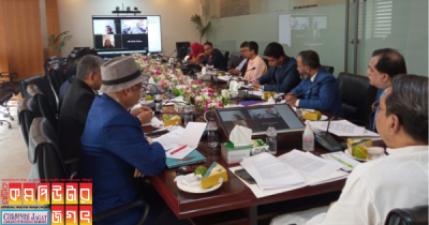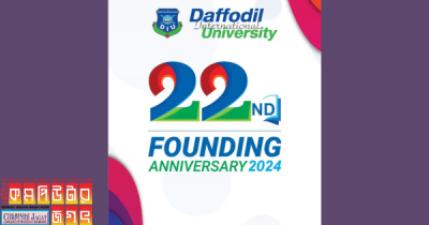Bangladesh
just became a part of the historical celebration of 50 years of the internet.
a2i of the ICT Division joined this with a virtual global summit as the
campaign partner, while participating in one of the major panel discussions.
The
Institute of Electrical and Electronics Engineers (IEEE), the world's largest
organization for technology professionals hosted this two-day long event
titled- ‘IEEE i50: A Virtual Celebration of 50 Years of the Internet’, in
collaboration with People-Centered Internet (PCI), on May 19 & 20, 2024.
Representing
Bangladesh, a2i’s Policy Advisor Anir Chowdhury participated in one of the
panel discussions titled ‘How can we ensure AI serves everyone, everywhere?’
The other discussants were luminaries like Kate Wilson, Senior Fellow, PCI; Fei
Fei Li, Co-Director, Stanford’s Institute for Human Centered AI and Keith
Strier, the VP, Worldwide AI, NVIDIA; US National AI Advisory Council.
Anir
Chowdhury, reflecting on the remarkable digital transformation journey of
Bangladesh, said, ‘In 2008 Bangladesh's per capita GDP was about $650, internet
penetration was less than 1%, and mobile penetration was only 1/6 of the
population.
But today, our per capita GDP has risen to $3,000, and we have
transitioned from a low-income to a middle-income country.
Focussing on
simplifying public service delivery, he added, ‘Our digital development impacts
are being measured through three key metrics: time, cost, and the number of
visits required to access government services.
Out of the 3,000 services we
provide, over 2,400 have been digitized, services delivered 6 billion times,
saving about 20 billion workdays, $30 billion cost, and 13 billion visits.
Stressing
on the possibilities of artificial intelligence and the government’s commitment
in shaping the future of Bangladesh through its Smart Bangladesh vision, he
stated, ‘Our journey with AI began around 2016-17, and by 2019, we introduced
the country's first AI guideline and have already drafted a national AI policy
too.
During the COVID-19 pandemic, we leveraged AI for syndromic surveillance
by utilizing data from telcos and community diagnostics.
He concluded, ‘In
Bangladesh, over the last two years, we have focused on what we call
"equality research endeavors" to understand the digital divide
better.
We concentrated on three areas: Connectivity, Digital and AI Skills,
and Service Design. A focus on human-centered, inclusive AI is essential.’
Keith
Strier stated, ‘The potential to harness AI, is not just to globally compete
with other nations, but within the nation.
We need an ai-enabled computational
infrastructure to protect the health of the population, to improve the quality
of healthcare and ultimately access to services.
All these things make
livability and quality of life higher.’ Fei-Fei Li
emphasized the importance of using AI responsibly.
She stated, ‘We want to
improve wellbeing. We want to keep the dignity and self-respect of humanity but
make the world better.
That's the intention of creating tools, but they do
become a double-edged sword because there are different undesirable uses of
tools.
Some by intention, some are unintended. So, given how incredibly
powerful AI is becoming, we absolutely should have responsible use of AI.
We
should put humans in the center in the design of AI in the development of AI,
in the deployment of AI and in the governance of AI.’
‘The
Internet has profoundly impacted people around the world over the last 50
years. If we want AI and technology to serve humanity, we must imagine, evolve
and work together to achieve a future of increasing opportunity for everyone
everywhere.’ - Mei Lin Fung, i50IEEE Chair, Co-founder People-Centered Internet
with Vint Cerf.
Tom
Coughlin, the 2024 IEEE President and CEO and IEEE Life Fellow Vint Cerf, Vice
President at Google and renowned as one of the ‘Fathers of the Internet’,
shared insights on shaping a future digital landscape that prioritizes people
amidst the growing presence of artificial intelligence (AI).
Around 30+ highly
acclaimed global tech luminaries participated in 12 panel discussion sessions
during the virtual global celebration.
In
celebration of its 50th anniversary, three significant achievements were
celebrated that greatly influenced the development of the Internet.
These were:
The TCP; i.e. Transmission Control
Protocol (1974), that provided the framework for connecting diverse
networks ; The IEEE 802 Standards
Committee (1980), which was pivotal in creating global network
communication standards, ensuring seamless compatibility among devices on wired
and wireless networks and Google's
PageRank Technology (1996), revolutionized web search engines by employing
an algorithm that analyzes web page relationships, improving users' access to
relevant information.
These accomplishments collectively highlight the
transformative impact of technological innovations on shaping the modern
internet landscape.

.png)












০ টি মন্তব্য